Mastering Libya’s Identity Verification: A Merchant's Guide with Shufti
Select an additional country

Thank you for submitting
We have sent you an email to download our Top 10 Most Difficult Countries for Identity Verification Report.
Got it Resend EmailUnderstanding the Challenges of Libyan Identity Documents
Verifying identity documents in Libya presents unique challenges due to the country’s complex linguistic, social, and administrative structures. Implementing effective identity verification systems requires advanced technology to handle these specific hurdles. This guide explores the key challenges associated with verifying Libyan identity documents and how Shufti can help merchants overcome them.
1. Linguistic and Script Complexity
Libya’s official language, Arabic, presents significant challenges for Optical Character Recognition (OCR) due to its unique characteristics:
Cursive Script and Ligatures
Arabic is written in a cursive script, with letters changing shape depending on their position in a word (beginning, middle, end, or isolated). For example, the letter "ح" (Ḥā) has four forms:
- Isolated: ح - Beginning: حـ (e.g., حَمزة) - Middle: ـحـ (e.g., مُحَمَّد)End: ـح (e.g., سَموح)
The dynamic nature of the script complicates recognition, requiring sophisticated OCR technology to accurately identify letters based on their contextual form.
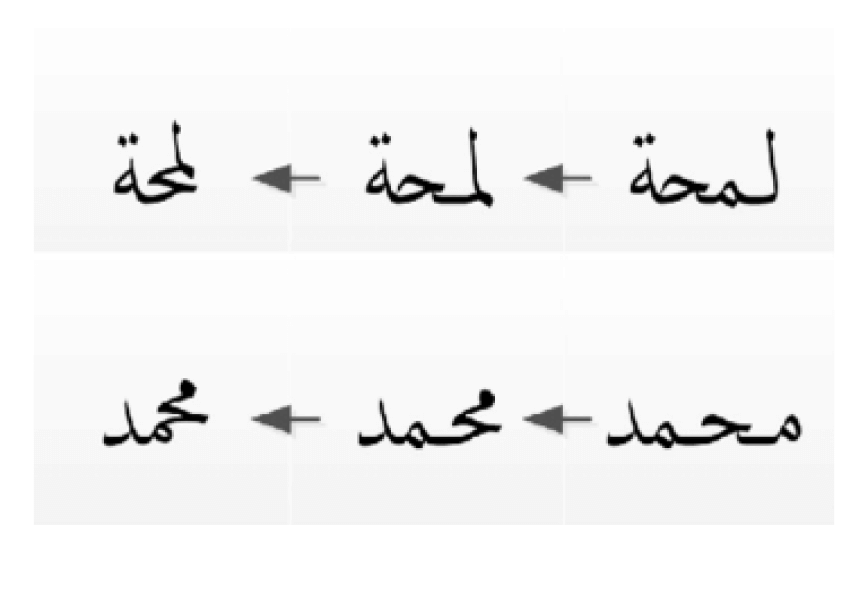
Complex Diacritical Marks
Arabic employs diacritical marks (harakat) to modify pronunciation and meaning. For example: عَلَم (flag) vs. عَلِم (he knew) Failure to capture these subtle marks accurately can lead to significant errors in interpreting names and other key data.
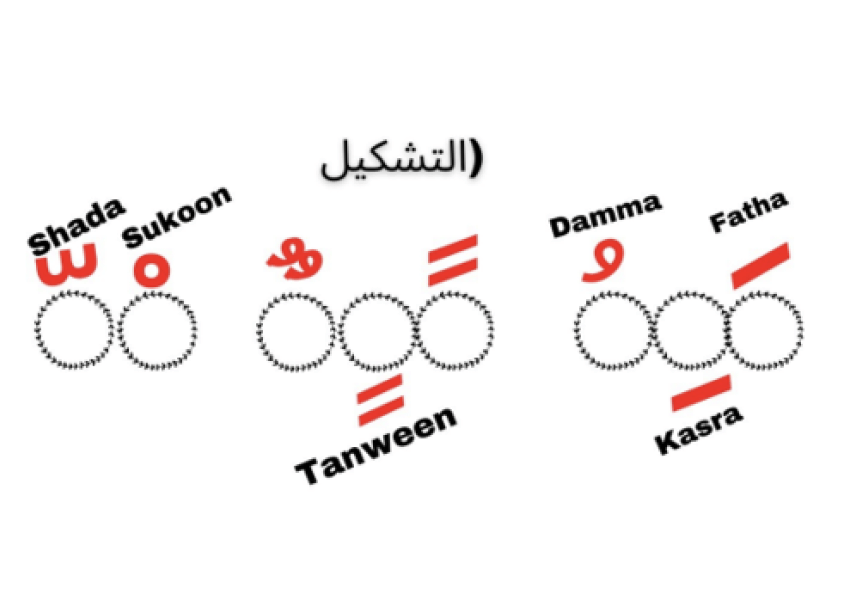
2. Handwritten ID Documents
One of the most significant challenges in verifying Libyan identity documents is the inclusion of handwritten information, particularly on older documents or those issued in certain regions. Both Libyan ID cards and driver's licenses can feature handwritten text, which poses challenges for traditional OCR systems. Advanced OCR technology is essential for accurately recognizing and processing these non-standard text formats and varying handwriting styles.
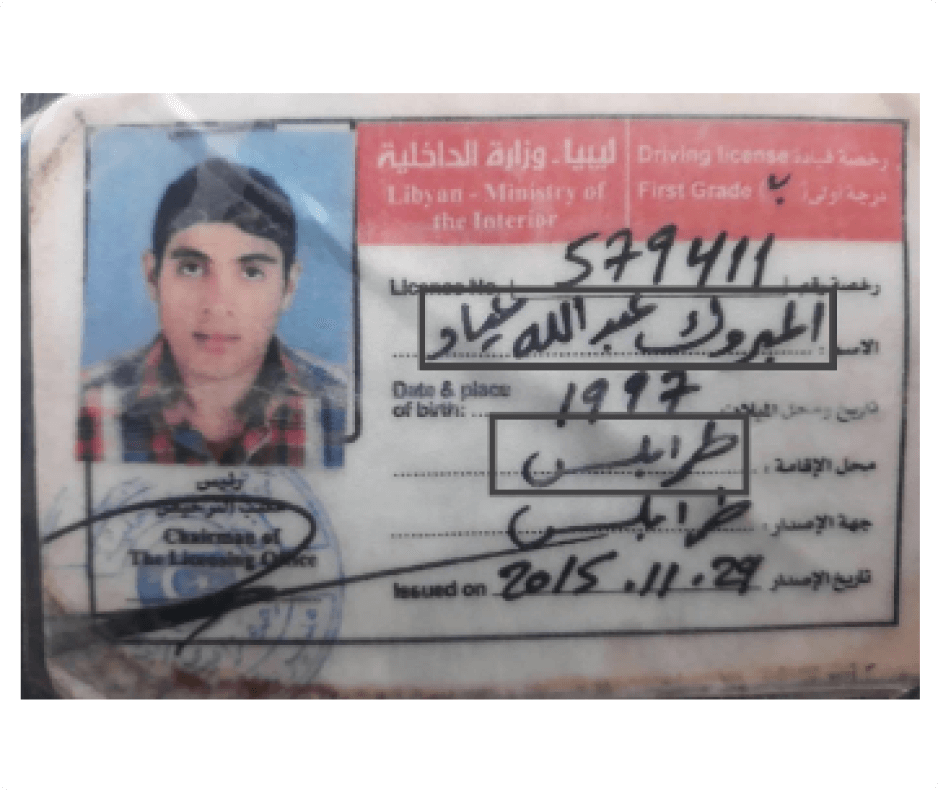
3. Complex Naming Structure and Cultural Differences
In Libya, names typically follow a structure that differs from Western conventions, adding complexity to identity verification processes:
Given Name (First Name):The individual’s personal name, e.g., "Umer," "Fatima."
Father’s Name (Middle Name): Rep resents the individual’s patrilineal heritage, e.g., "Salah," "Umair."
Surname/Title (Last Name): Usually signifies the Title given to a person by tribal affiliation or family, e.g., "Al-Tairi."
Tribal or Extended Family Name: Sometimes included for tribal or regional background, e.g., "Al-Misrati," "Al-Warfali."
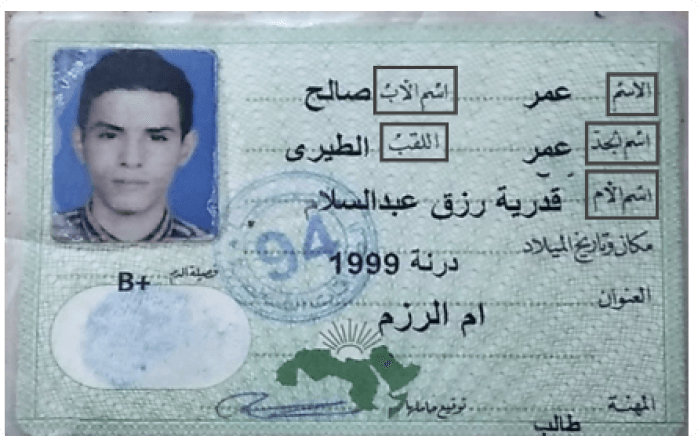
In addition to this, Arabic personal names can be complex, often including tribal or familial components, and can have multiple Romanized spellings. For example:
"محمد" can be transliterated as Muhammad, Mohammad, or Mohamed
4. Bilingual ID Documents
Though Arabic is the dominant language, certain documents, such as Libyan passports, also include English text. This dual-language format can be challenging for verification systems, as they must switch between Arabic and English while preserving context and accuracy.
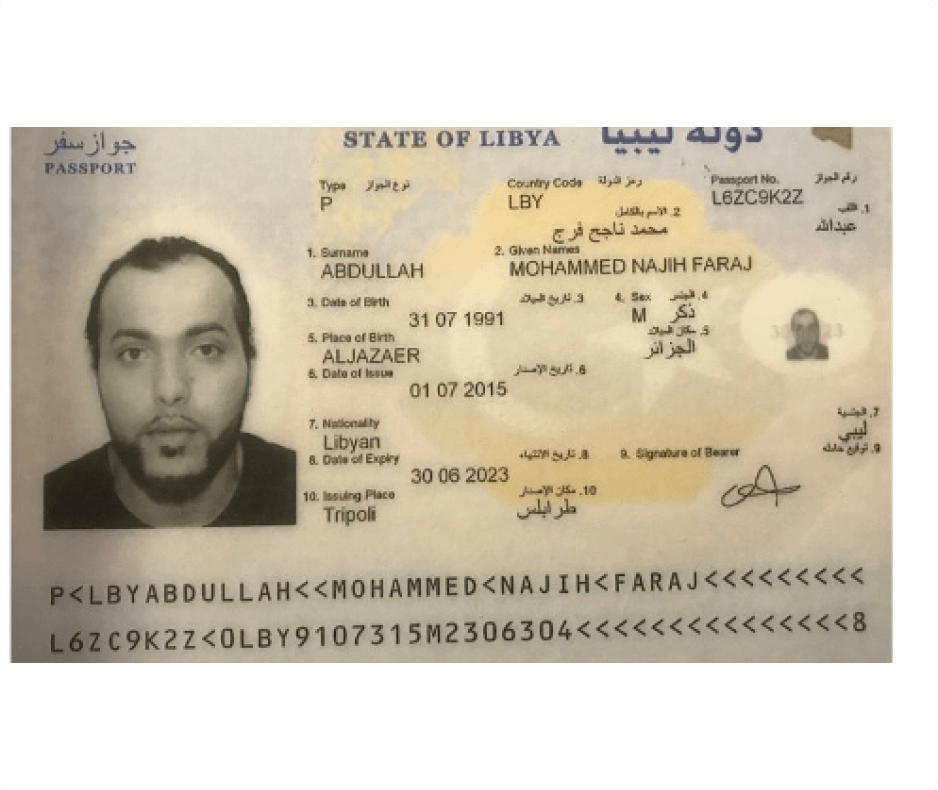
A Merchant’s Guide to Identity Verification in Libya
In Libya, merchants face specific challenges when verifying key identity documents such as national ID cards, passports, and driver's licenses. Shufti offers two distinct Verification Modes: Onsite Verification Mode and Offsite Verification Mode — allowing merchants to choose the most appropriate method based on their use cases.
Download the Top 10 Most Difficult Countries for Identity Verification
Download full report1. Verification Modes
Onsite Verification
The onsite verification process by Shufti offers an intuitive and direct interaction for end users through the sophisticated iFrame/Verify component. This user-centric approach enables individuals to seamlessly submit the required verification proofs, such as ID and address documents, etc., while receiving real-time guidance to navigate the verification process effortlessly. Upon completion, the verification results are made readily available to clients through the comprehensive Back Office portal or can be conveniently delivered via an API response, providing flexible and efficient access to vital information.
Offsite Verification
The offsite verification process by Shufti is characterized by its efficient and straightforward approach. In this, clients are responsible for gathering the necessary verification proofs/data from end users. This process streamlines the collection of essential data, enabling clients to submit it directly to Shufti effortlessly for verification. The verification results are conveniently accessible either via the comprehensive Back Office portal or can be readily retrieved through an API response. This flexibility ensures clients have efficient access to critical information.
2. Document Types Selection
In Libya, various identity documents serve different purposes and offer varying levels of security and verification capabilities. Here's a brief overview of some of the key identification documents and their features:
ID Card: The Libyan national ID card is widely used across the country for identity verification, particularly in sectors like banking, healthcare, and education. Older versions or regionally issued national ID cards often contain handwritten information, such as personal details or addresses. These handwritten information presents a challenge for OCR systems.
Driver's License: Libyan driver's licenses are another common form of identification, especially in the transport and logistics industries. Many of these licenses, particularly older or regionally issued versions, include handwritten details such as addresses or special endorsements.
Passports: Libyan passports are recognized for their high security and include biometric data, aligning with international standards for secure identification. The dual-language format, featuring both Arabic and English, supports effective verification in diverse contexts.
3. Document Type Preference
and Performance
Different types of Libyan identity documents yield varying success rates in verification
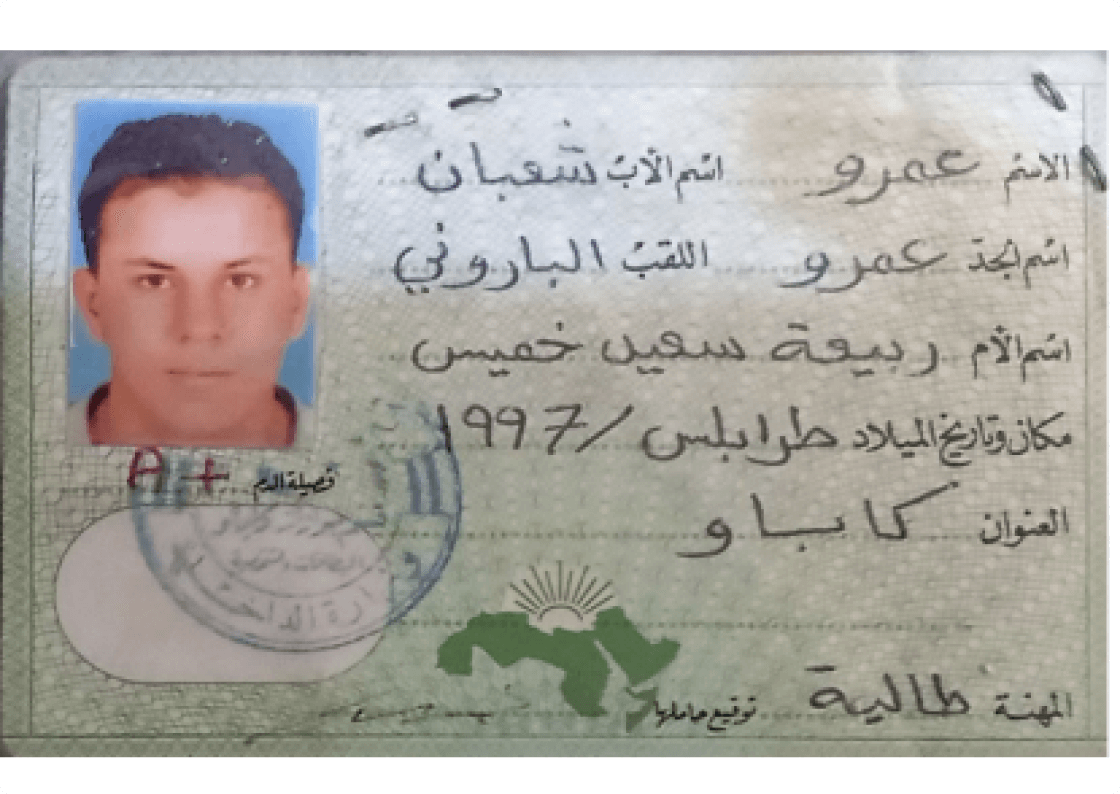
ID Card
The national ID card is a primary form of identification in Libya, widely used across the country. Its standardized format allows for accurate and efficient OCR processing. Shufti’s advanced features enhance the verification process, offering seamless document reading and data extraction.
Extraction Parameters: Name, father’s name, date of birth, issue date
Driver's License
Libyan driver's license vary across regions, with multiple security and design features. Shufti's OCR technology is tailored to manage these differences, providing accurate data extraction and verification, though some cases may require extra processing time.
Extraction Parameters: Name, date of birth, issue date, document number
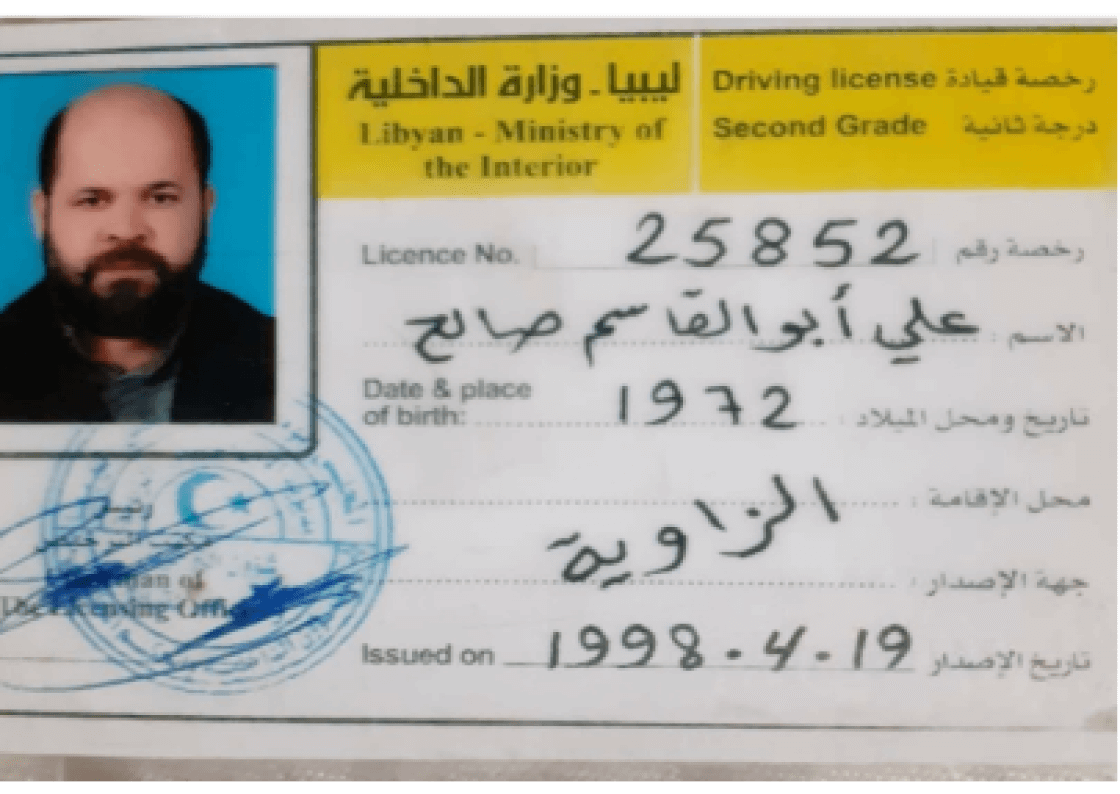
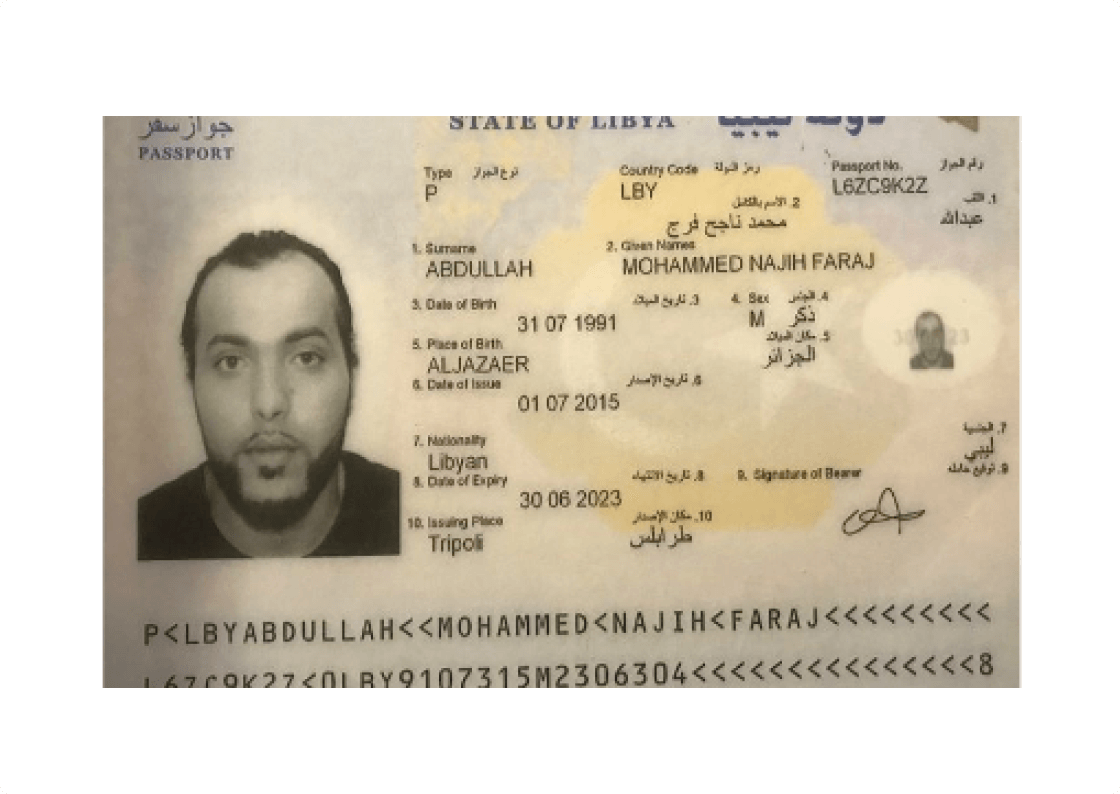
Passport
Libyan passports include a range of security features such as MRZ, holograms, and watermarks, which can pose challenges for OCR technology. Shufti’s systems are designed to handle these complexities, ensuring secure and reliable verification.
Extraction Parameters: Name, date of birth, issue date, document number, expiry date, gender, nationality, gender, place of issue
4. Preferred Document for Identity Verification
As Shufti, we recognize the Libyan national ID card and passport as the preferred documents for identity verification in Libya. The national ID card and passport, with their robust security features, are the primary choices for reliable identity verification. The driver's license is also widely accepted for verification, particularly for domestic transactions. Our advanced OCR technology is optimized to handle Arabic scripts, document-specific features, and handwritten elements, ensuring fast and accurate data extraction for secure identity verification.
Verification Settings
1. Verification Mode (Onsite vs. Offsite)
Onsite verification is preferred due to the complexity of handwritten information in Libyan documents. AI-driven and biometric technologies further enhance reliability. This method offers a higher accuracy rate and better control over the verification process.
2. Data Extraction
OCR technology plays a crucial role in Libya, particularly due to the prevalence of handwritten text in identity documents like ID cards and driver's licenses. Advanced OCR systems must handle the complexities of Arabic scripts, characters, and symbols. Furthermore, these systems should be capable of accurately processing handwritten information, as both ID cards and driver's licenses often contain such text.
3. Identity Document’s Backside Proof
Libyan identity documents frequently contain critical information on the backside, including addresses and expiry dates. Merchants should ensure that both sides of the document are submitted to guarantee comprehensive verification. This practice is vital for capturing all relevant details and ensuring the authenticity of the document.
4. Real-Time Proof Capture Vs. Proof Upload
Libyan identity documents can be verified through two flexible proof methods: real-time proof capture and proof upload, giving users the option to choose their preferred method based on convenience and accessibility.
Real-Time Proof Capture
Shufti’s auto-capture technology automatically detects and captures documents, ensuring a fast and reliable verification process. This method is highly efficient for real-time interactions.
Proof Upload
For users who already have scanned documents, proof upload provides a simple and efficient method for verification. This approach is ideal for pre-scanned copies of documents, offering convenience and ease of use.
Merchants can enable Allow Online (real-time proof capture) and Allow Offline (proof upload) options available in the Verification setting Tab. By offering both real-time capture and proof upload, Shufti ensures flexibility, providing the best user experience regardless of whether physical or electronic documents are being verified.
5. Verification Settings
Given that many Libyan ID cards and driver's licenses include handwritten information, it is crucial for merchants to allow handwritten documents in their verification processes. Allowing handwritten documents can significantly increase the conversion rate by ensuring that documents with handwritten elements are not excluded from verification. This approach enhances the flexibility of the verification process and ensures that all valid documents are considered, improving overall verification accuracy and user experience.
Download the Top 10 Most Difficult Countries for Identity Verification
Download full reportClick on a country to see the unique requirements that must be addressed.


Brazil
Mastering Brazilian Identity Verification: A Merchant's Guide with Shufti
Effective identity verification in Brazil requires a deep understanding of the distinct features and challenges of Brazilian identity documents. Merchants must navigate different formats, languages, and security features to ensure reliable verification. This guide provides a comprehensive overview of Brazil's identity documents and the best practices for merchants engaging in identity verification.
Read Brazil’s Merchant Guide Book
Libya
Mastering Libyan Identity Verification: A Merchant's Guide with Shufti
Verifying identity documents in Libya presents unique challenges due to the country’s complex linguistic, social, and administrative structures. Implementing effective identity verification systems requires advanced technology to handle these specific hurdles. This guide explores the key challenges associated with verifying Libyan identity documents and how Shufti can help merchants overcome them.
Read Libyan’s Merchant Guide Book
Nigeria
Mastering Nigerian Identity Verification: A Merchant's Guide with Shufti
Nigeria’s identity verification systems are fraught with numerous complexities, arising from a combination of socio-cultural, infrastructural, and technological factors. As the country transitions towards digital identity solutions, recognizing and addressing these challenges is crucial for ensuring secure, accurate, and inclusive verification processes. Shufti’s OCR and verification technology is specifically designed to address these challenges and provide accurate, efficient, and reliable identity verification solutions.
Read Nigeria’s Merchant Guide BookMastering Indian Identity Verification: A Merchant's Guide with Shufti
Effective identity verification in India requires a comprehensive approach due to the distinct characteristics and complexities of Indian identity documents. Shufti’s OCR and verification technology is specifically designed to address these challenges and provide accurate, efficient, and reliable identity verification solutions.
Read Indian’s Merchant Guide Book
India

Ethiopia
Mastering Ethiopian Identity Verification: A Merchant's Guide with Shufti
Effective identity verification in Ethiopia requires a comprehensive approach due to the distinct characteristics and complexities of Ethiopian identity documents. Shufti’s OCR and verification technology is specifically designed to address these challenges and provide accurate, efficient, and reliable identity verification solutions.
Read Ethiopian’s Merchant Guide Book
South Africa
Mastering South African Identity Verification: A Merchant's Guide with Shufti
Effective identity verification in South Africa requires a deep understanding of the distinct features and challenges of South African identity documents. Shufti’s OCR and identity verification technology is optimized to handle these complexities:
Read South African’s MerchantGuide Book
Mastering Burmese Identity Verification: A Merchant's Guide with Shufti
Effective identity verification in Myanmar requires a thorough understanding of the unique characteristics of Burmese identity documents. Shufti’s OCR and identity verification systems are designed to address these challenges, ensuring high accuracy and compliance.
Read Burmese’s Merchant Guide Book
Myanmar
Mastering Cambodian Identity Verification: A Merchant's Guide with Shufti
Effective identity verification in Cambodia requires a comprehensive approach due to the distinct characteristics and complexities of Cambodian identity documents. Shufti’s OCR and verification technology is specifically designed to address these challenges and provide accurate, efficient, and reliable identity verification solutions.
Read Cambodia’s MerchantGuide Book

Cambodia
Mastering Sri Lankan Identity Verification: A Merchant's Guide with Shufti
This guide helps Sri Lankan merchants, institutions, and service providers understand identity verification challenges, emphasizing the importance of accurate verification in finance, telecommunications, and e-commerce. It stresses compliance with KYC and AML regulations to avoid penalties and loss of trust. Shufti’s advanced technology offers a solution with OCR, biometric verification, and document validation, handling Sinhala and Tamil scripts, complex diacritics, and Gregorian/Buddhist date conversions for accurate onsite and offsite verification.
Read Sri Lankan’s MerchantGuide Book

SriLanka
Mastering Japanese Identity Verification: A Merchant's Guide with Shufti
Effective identity verification in Japan requires a comprehensive approach due to the distinct characteristics and complexities of Japanese identity documents. Shufti’s OCR and verification technology is specifically designed to address these challenges and provide accurate, efficient, and reliable identity verification solutions.
Read Japanese’s MerchantGuide Book

Japan
Explore our ROI Calculator
Secure your business, achieve compliance, and accelerate growth effortlessly with our cutting-edge digital identity verification solution
ROI CalculatorGet the Shufti newsletter
Stay ahead of the curve with fresh takes on the latest identity innovations.
Take the next steps to better security.
Contact us
Get in touch with our experts. We'll help you find the perfect solution for your compliance and security needs.
Contact us
 Explore Now
Explore Now






